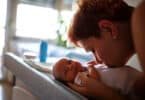
For their study, researchers assessed 246 mothers with children diagnosed with an autism spectrum disorder and 149 mothers that did not have a child with the condition. One in four moms with a child on the autism spectrum disorder were found to have an immune system that produced antibodies linked to language deficits, increased irritability and self-injury in children. These same antibodies were only found in about one percent of the tested mothers who did not have a child with autism.
When pregnant, the mother’s immune system passes antibodies to the child. This is supposed to protect the baby from infections through the pregnancy and until about six months after birth. However, in some of the mothers, the antibodies produced were actually counterproductive, directing themselves against fetal brain tissue, which could be the reason for autism in some children.
“Facilitated passage of the IgG antibodies during human gestation is a well-characterized phenomenon that provides passive protection for the newborn child, which persists in the child up to 6 months post-natally,” the authors wrote in the journal Transitional Psychiatry. “However, autoantibodies that react to fetal ‘self’ proteins can also cross the placenta. In addition, the blood-brain barrier is not fully mature during early brain development.”
A second study, published in the same journal by the same research team, showed the significance of the possible link between the antibodies and autism traits. When eight pregnant rhesus monkeys were exposed to the human antibodies from mothers of children who already had children on the autism spectrum, the baby monkeys born displayed traits very similar to autism: they made inappropriate approaches to unfamiliar peers that did not end up leading to common social interactions between monkeys, for example, grooming or playing. Additionally, the male offspring had enlarged brain volumes, which is consistent the brain imaging results of some autistic children.
If what the study authors have found holds up over time, researchers may be able to develop an early diagnosis test that would detect the potential of autism before a child is even born. This, in turn, could lead to early medical interventions that could limit the fetus’s exposure to the damaging antibodies, thereby reducing the possibility and maybe even the prevalence of autism.
Related Articles:
- Doctors Express Concern Over Wide Use of Melatonin as Sleep Aid for Children
- Low Cost Test Tube Solution for Developing Countries in the Works
- Screening Test for Detecting Pre-eclampsia at 15 Weeks to Start Clinical Trials






